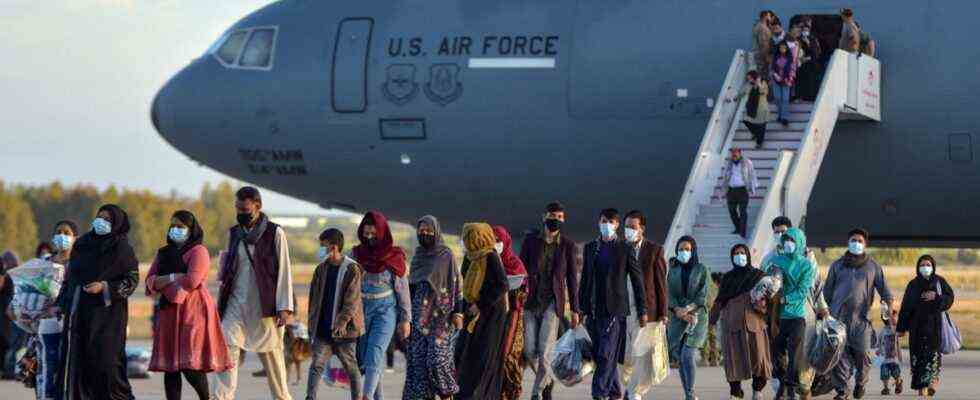The Federal Government is working to ensure that former local members of the Bundeswehr, German ministries and organizations and Afghans who are particularly vulnerable are allowed to leave and come to Germany after the end of the military evacuation mission. Federal Foreign Minister Heiko Maas negotiated this on a trip to neighboring Afghanistan and Qatar. the Southgerman newspaper answers key questions about the effort.
How many local workers and other vulnerable people should still be removed from Afghanistan?
The information on this fluctuates. The number in circulation of around 40,000 for Germany is based on an estimate. It includes both local staff and people who are considered to be particularly at risk for other reasons and who have been accepted. In addition, there is sometimes the closest group of family members. The US, which has led the military operation in Afghanistan for almost 20 years, expects at least 200,000 people to be eligible for two special visa programs for employees of the US military and American organizations, rather than the military one Evacuation mission could be flown out.
Who determines who is on these lists?
Ultimately, the federal government. German government agencies have reported their local staff to the Federal Foreign Office, which keeps the evacuation lists. The federal government has made acceptance commitments for local staff who have worked for German authorities since 2013. In addition, Afghan journalists, human rights activists and employees of non-governmental organizations as well as other particularly vulnerable people should be able to come to Germany. You can take your closest relatives, i.e. spouses and your own underage children, with you.
Will the Taliban let these people leave the country?
In negotiations with various countries and also publicly, the Taliban have promised that all Afghans who have a valid passport and a valid visa can leave the country. The German government is in contact with the Taliban through diplomat Markus Potzel in Doha and tries to make it clear to them that recognition and continuation of development aid depend not least on safe conduct for the local staff. The USA, the EU states and many others have in one joint statement their expectation that they will be allowed a safe and orderly exit. Details of the negotiations are confidential. The problem to be solved is whether and how people willing to leave the country can be identified with the Taliban.
How can they leave Afghanistan at all?
On the way to safety, the greatest danger lurks overland at the Taliban’s checkpoints. This must prove what the Islamists’ promise to allow people to leave the country even after the end of the military airlift. The next hurdle is then entering the neighboring countries. They fear chaotic conditions at the borders when word gets around that, with the help of Germany, there is a way out of Afghanistan. The rescue convoys will therefore have to move under the most conspiratorial circumstances possible. It is also unclear how many people can be brought to Germany via Pakistan, Tajikistan or Uzbekistan in this way.
Are there alternatives to the overland route?
The Federal Foreign Office is therefore counting on being able to fly people directly from Afghanistan again as soon as possible. The USA, Turkey and Qatar are currently negotiating with the Taliban about a possibility of temporarily putting the badly battered airport in Kabul into operation so that charter planes can resume the airlift. The Taliban are ready to secure the site from the outside, but would have to allow foreign companies to take over the rule at the airport, for example for security checks. The airport in Mazar-i-Sharif also plays a role in the federal government’s planning. From there, too, people could be flown out to neighboring countries in charter planes.
How do people get their exit papers?
According to the Foreign Office, that is the smallest problem. The usual, often lengthy, procedures have been temporarily suspended with the consent of the Interior Ministry. Those affected will now receive their regular visas upon arrival in Germany. German diplomats are to take care of the formalities at the Afghan borders.
What will happen to those people whose name is not on one of the lists, but who are nevertheless in danger?
The Federal Government assumes that the vast majority of local workers who are entitled to refuge in Germany have already reported and are registered. However, your entitlement does not expire even if you have not yet been on any list. There is no deadline for them that can expire. It is different with people who have drawn the hatred of the Taliban, for example as a journalist or judge. The federal government has given a number of people from these “vulnerable groups” an acceptance letter. This list was closed with the end of the airlift on Thursday last week. This is justified, among other things, with the concern of neighboring countries about a mass exodus from Afghanistan. There could be exceptions in individual cases; But the federal government does not like to talk about it.

